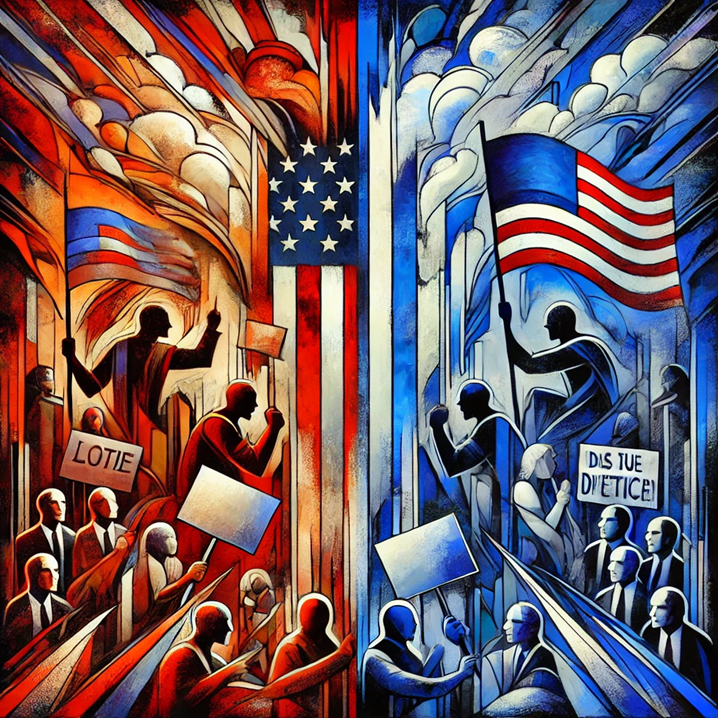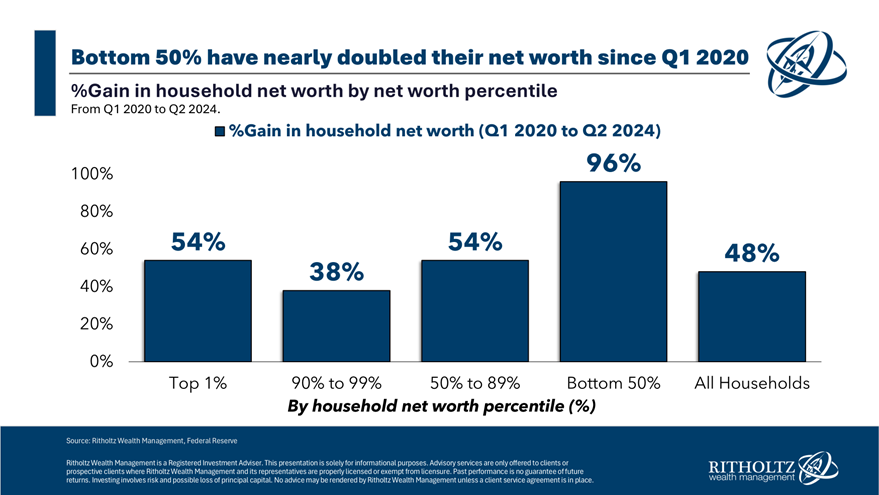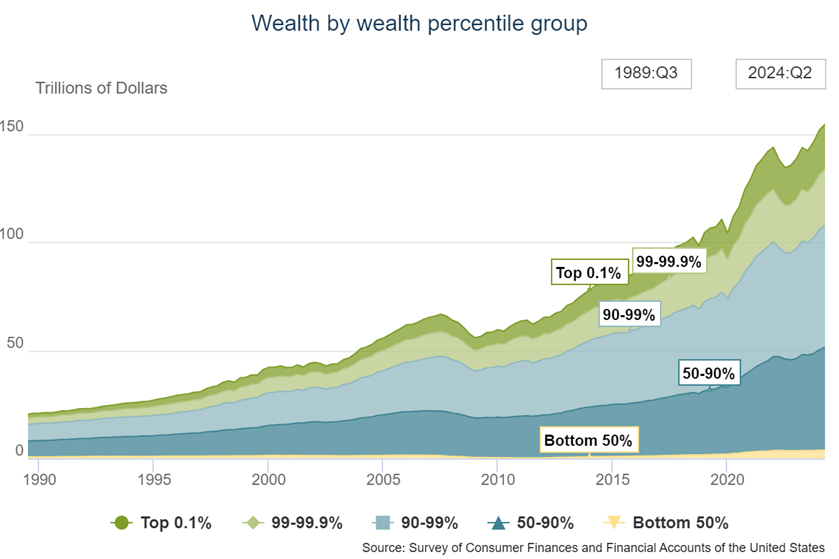On November 5, there was a lot of sound. There was a lot of fury. There was a lot of nail-biting. There was a lot of jaw-clenching.
But in the end, here’s what the American presidential race was really about: fairness.
Yes, that’s right: fairness.
It is that simple to pronounce…and yet that difficult to pull off.
Because — let’s face it — everyone has different ideas about what fairness is.

Source: Image generated by OpenAI’s DALL-E
During this election cycle, Team Red locked horns with Team Blue. Both sides debated the role that fairness should play in American daily life:
- From taxes to abortion; from immigration to education; everything was fiercely contested here. At times, this campaign felt like an ideological minefield. Just one stray step could risk setting off a chain reaction of explosions. Ouch.
- As Jill Filipovic of Slate recently said: ‘America has long been obsessed with the concept of fairness. This election, it might cost us.’
- Is there a ring of truth here? Yes, perhaps there is.
For over 240 years now, this idea of creating a ‘level playing field’ in the United States has proven to be both inspiring and antagonising:
- Why? Well, you could argue America was the first country to have social mobility baked into its DNA. Unlike the Old World countries in Europe, America didn’t start out with any sense of aristocracy or royalty. Instead, what it did have was a sense of frontier adventurism and entrepreneurship.
- Here’s how the logic goes: if you are willing to dream big and work hard, you can move up the social ladder. This is not only allowed, but encouraged.
This American Dream is admirable. It is spelled out in the Constitution:
We hold these truths to be self-evident, that all men are created equal, that they are endowed by their Creator with certain unalienable Rights, that among these are Life, Liberty and the pursuit of Happiness.
Indeed, these famous words have taken on a mythic power that transcends generations. Everyone should have a fair shot at success. Everyone should have the chance to be all they can be. It captures the popular imagination, doesn’t it?
- But here’s the thing. There has always been a disconnect between national mythology and national reality. A wealth gap between the haves and have-nots; between the privileged and underprivileged.
- For example, many of the Founding Fathers of the United States were, in fact, slave owners. So, when they said that ‘all men are created equal’, they didn’t seem to think that it should apply immediately to everyone. At the time, their optimistic words appeared to be symbolic, not literal.
- Mind you, the Founding Fathers were not evil men. They were simply regular men who aspired to build a great nation — but they were limited by the reality of the 18th century in which they lived.
- Certainly, the Founding Fathers understood that a democratic republic — without the presence of a monarchy or a nobility — was a fresh innovation. No one truly had any idea whether this would work.
- So, given the circumstances, perhaps the best they could do was lay down the foundations for the Great American Experiment. They were well aware that this would have to be a multi-generational project. Positive change would come…but not overnight.
Here’s a quote from John Quincy Adams, which sums up what the early American approach to social progress would be:
I have to study politics and war so that my sons can study mathematics, commerce and agriculture, so their sons can study poetry, painting and music.
This is where the American obsession with fairness really comes from. It’s directly linked to the perception of social mobility. It’s about visible improvement. It’s about taking measured steps forward:
- So, in the 21st century, has America has become less fair today than it has been in the past? Has social mobility somehow stalled? Is this causing a large segment of the population to become angry and restless?

Source: A Wealth of Common Sense
Well, here’s what the numbers tell us:
- Over the past four years, the bottom 50% of Americans households have actually seen their net worth increase at a faster rate than the upper 50% of American households.
- Surprisingly enough, the bottom 50% are even beating the top 1% in this area.
- On the surface of it, this is positive progress.

Source: A Wealth of Common Sense
However, we also have to acknowledge a sobering reality:
- Even if the bottom 50% have almost doubled their net worth, they still only control a tiny slice of America’s wealth. Indeed, the bottom 50% are entirely overshadowed by the upper 50%. The margin here is huge.
- Most strikingly, you might argue that any gains in wealth over the past few years have been negatively eroded by the cost-of-living crisis. It’s hard to feel richer when you see your grocery bill climbing, putting pressure on your household.
- Indeed, with inflation running at its highest rate in 40 years, it was hard for the bottom 50% to feel positive. MarketWatch called this situation ‘the killer of governments.’
So, if you’re wondering why Team Red prevailed over Team Blue during this election cycle, perhaps it comes down to one thing. Team Red may have done a better job of addressing the economic worries of disaffected households:
- Just imagine this. What if you happen to be a swing voter who lives in a Rust Belt state like Michigan, Ohio, or Pennsylvania? What if you’ve experienced massive urban decay as factories have shut down and manufacturing jobs have left the industrial heartland? What if you’re worried about your financial future?
- Well, Team Red’s message for you is this: ‘We understand that the playing field doesn’t look fair for you and your family. We promise to put you first. We promise to restore fairness.’
- In response, you might nod your head. You might say, ‘Yes, this doesn’t feel fair to me. I’m not getting the level playing field I deserve. So, I’m going to vote for you.’
Indeed, the power of using the right message at the right time can be profound. It shouldn’t be underestimated. Here’s what author Barry Eisler had to say about the role of messaging in the presidential race:
The foregoing tracks with something I’ve long observed about humans: they have more trouble changing the frequency than they do the volume. That is, when a tactic isn’t working, humans tend to do it harder rather than changing to a different tactic.
When the music you’re playing is unappealing to your audience, playing it louder not only won’t solve the problem—it will irritate the people you’re trying to please. That Harris outspent Trump three-to-one would be an example of playing the music louder when the right move was to change the station.
So, Team Red won this election cycle for one reason and one reason alone. They understood that tuning into the correct radio frequency was more important than fiddling around with the radio volume:
- Of course, you don’t have to agree with Team Red’s messaging. You don’t even have to like it. But, still, you should acknowledge why Team Blue never really stood a chance here.
- In a United States that remains divided between the haves and have-nots; between the privileged and underprivileged; it’s clear to see that the bottom 50% of households were ready to rebel. And the easiest way for them to rebel was to simply vote out an existing government, then replace it with a fresh one.
Yes, of course. Fairness. It represents a cherished ideal that Americans will instinctively respond to and gravitate towards:
- Certainly, you might argue that fairness may not exist in absolute terms. It can only exist in relative terms — and even then, it’s defined by how you choose to frame it. There is no such thing as one-size-fits-all.
- But, still, fairness remains deeply embedded in the country’s cultural fabric. It’s as American as apple pie and baseball. And that’s what makes it so emotionally compelling.
- Team Red, for all their faults and frailties, simply did a better job of presenting a vision that most ordinary Americans would support.
- Meanwhile, Team Blue tripped and stumbled. Their messaging didn’t work. They just couldn’t connect with swing voters in an authentic way.
- Perhaps inflation — that killer of governments — was the ultimate black hole here. It was simply too big for most Americans to overlook, let alone forgive. Tragically, this may have sealed Team Blue’s fate.
According to John Burn-Murdoch of the Financial Times, Team Blue suffered the steepest drop in the popular vote since 1980:
- Mind you, this isn’t a uniquely American experience. Across the world, we saw 10 major countries holding national elections this year. And guess what? In each and every case, incumbent political parties were punished at the polls.
- Why? Well, why not? Jim Carville served as Bill Clinton’s strategist in 1992. He believes that elections come down to one simple thing: ‘It’s the economy, stupid.’
- Therefore, any incumbent must address this issue in a convincing way — or they will surely pay the price.
- This is not a matter of political orientation. This is simply a matter of common sense.
It’s time to have your say
I hope that you’ve enjoyed reading our articles as much as we’ve enjoyed writing them:
- Your prosperity is our focus — which is why we are always working hard to uncover new opportunities beyond the radar for you.
By the way, I have a small favour to ask:
- Would you like to write a review of our work here at Wealth Morning?
- Do you want to let us know if our stories have inspired you in a positive way?
- Do you want to let us know if our stories have helped you become a more successful investor?
We truly value your feedback It encourages us. It helps us to do better. It helps us to reach further:
- So, if you’d like to leave us a review, it’s quick and easy. It will only take two minutes of your time.
- Thank you so much in advance for your kindness and generosity. Your readership keeps us going!
Regards,
John Ling
Analyst, Wealth Morning
(This article is the author’s personal opinion and commentary only. It is general in nature and should not be construed as any financial or investment advice. Wealth Morning offers Managed Account Services for Wholesale or Eligible investors as defined in the Financial Markets Conduct Act 2013.)





John is the Chief Investment Officer at Wealth Morning. His responsibilities include trading, client service, and compliance. He is an experienced investor and portfolio manager, trading both on his own account and assisting with high net-worth clients. In addition to contributing financial and geopolitical articles to this site, John is a bestselling author in his own right. His international thrillers have appeared on the USA Today and Amazon bestseller lists.